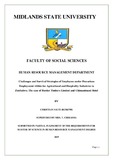Please use this identifier to cite or link to this item:
https://cris.library.msu.ac.zw//handle/11408/4049Full metadata record
| DC Field | Value | Language |
|---|---|---|
| dc.contributor.author | Sauti, Christian | - |
| dc.date.accessioned | 2020-12-17T12:15:07Z | - |
| dc.date.available | 2020-12-17T12:15:07Z | - |
| dc.date.issued | 2019 | - |
| dc.identifier.uri | http://hdl.handle.net/11408/4049 | - |
| dc.description.abstract | The purpose of the study was to investigate the challenges faced and survival strategies used by employees under precarious employment at BTL and CH representing the agricultural and hospitality industries in Zimbabwe respectively. Out of 1666 total population at BTL and 68 employees at CH, the sample size of 20 participants was chosen from each organisation through quota, convenience and purposive sampling. Qualitative research approach and the multiple case study research design was adopted to deconstruct deeply into the research phenomenon. The research was conceptually guided by the Employment Strain Model by Lewchuk, Clark, de Wolff, and King (2003) and it focused on both primary and secondary sources of data. Data was collected through open-ended questionnaires, semi-structured interviews and focus group discussions, and thematic analysis was used in analysing the data. Major inferences from the research revealed that seasonal, fixed term, casual, part-time work, graduate trainee/student attaches, and permanent contracts were prominent forms of work whose conditions punctuates precarious employment in the hospitality and agricultural industries in Zimbabwe. The participants expressed that they suffer heightened employment insecurity, sexual harassment, poor occupational health and safety, limited social protection and limited workplace representation on fundamental rights at work. Sexual harassment has been found most ubiquitous at CH whereas limited access to training and development was more experienced at BTL. From the study, it was identified that moonlighting, fiddling and sabotaging, surviving by God’ grace, ‘kukiya-kiya’, pilferage, drug abuse, farming and gold panning and workplace romance were survival strategies used to mitigate the challenges of precarious employment conditions. However, farming and illegal gold mining, hardworking and drug abuse were dominantly used at BTL while workplace romance was a common coping strategy for workers at CH. It was found that the employers were not adhering to the dictates of Labour Act [Chapter 28:01] and its amendments, SI15 of 2006, NSSA Act, ILO’s Decent Work Agenda and its conventions in addressing the challenges faced by employees under precarious working conditions in the agricultural and hospitality industries in Zimbabwe. The participants stated that there is not any specific legislation to deal with indecent work conditions in Zimbabwe hence the frameworks are considered managerial templates to fuel modern day slavery. From the foregoing, recommendations were made for the industries to develop precarious employment policies to govern the working conditions for the precariates, to adhere to the existing legal frameworks on precarious work and for the HR function to advise workers and management that the precariates should be treated equitably and enjoy workplace representation and protection against unfair labour practices. | en_US |
| dc.language.iso | en | en_US |
| dc.publisher | Midlands State University | en_US |
| dc.subject | employees under precarious employment | en_US |
| dc.subject | challenges and survival strategies | en_US |
| dc.subject | agricultural and hospitality industries | en_US |
| dc.title | Challenges and survival strategies of employees under precarious employment within the Agricultural and Hospitality Industries in Zimbabwe : the case of Border Timbers Limited and Chimanimani Hotel | en_US |
| dc.type | Thesis | en_US |
| item.openairecristype | http://purl.org/coar/resource_type/c_18cf | - |
| item.fulltext | With Fulltext | - |
| item.openairetype | Thesis | - |
| item.grantfulltext | open | - |
| item.languageiso639-1 | en | - |
| item.cerifentitytype | Publications | - |
| Appears in Collections: | Master Of Science In Human Resource Management Degree | |
Files in This Item:
| File | Description | Size | Format | |
|---|---|---|---|---|
| MSc Sauti Christian.pdf | Full Text | 2.98 MB | Adobe PDF |  View/Open |
Page view(s)
442
checked on Feb 28, 2026
Download(s)
476
checked on Feb 28, 2026
Google ScholarTM
Check
Items in MSUIR are protected by copyright, with all rights reserved, unless otherwise indicated.



